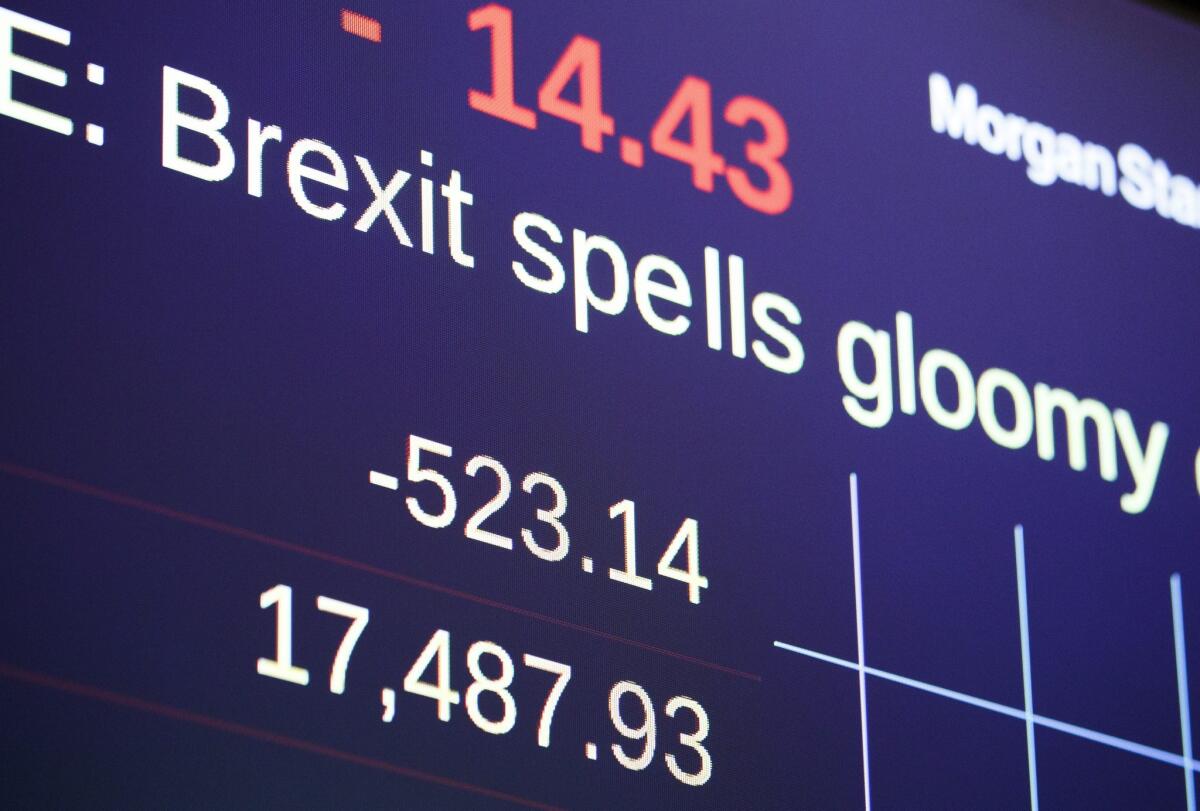Three reasons why Americans should care about ‘Brexit’

- Share via
What Britain does, or doesn’t do, might not seem relevant to investors and consumers on this side of the Atlantic. But just like a Cadbury Creme Egg, there is more than meets the eye about Thursday’s historic vote to leave the European Union.
The vote to exit the 28-nation EU bloc is a move that will have an impact on Americans’ investment portfolios, retirement savings and more. Here’s how:
1. U.S. stock market
If there is anything that investors hate, it’s uncertainty, and the prospect of a British exit, or “Brexit,” from the EU made investors in both the U.S. and the U.K. nervous. In a NerdWallet analysis of data at political betting site PredictIt, which calls itself a stock market for politics, we found that the odds of a British exit over the past three months tracked the VIX index, a measure of volatility in the Standard & Poor 500. The VIX measure of market risk tends to swing wide when investors are fearful.
Indeed, stocks in the U.K. and Europe tumbled after the exit vote was announced, and futures for U.S. stocks showed steep declines before the market opened early Friday morning.
Why is the fate of Britain’s EU membership intertwined with U.S. markets? One reason is that businesses also hate uncertainty.
American banks forecast a 5% to 9% drop in profits next year for U.S. businesses when Britain leaves the EU, according to the investment bank KBW. The economic hit here will come as businesses hold off on making investments until the full impact of Brexit is known. Business investments create jobs and generate future profits, so U.K. voters may have just taken away some confidence in the U.S. economy.
However, some economists think that the impact could be muted. “The British wanted to remain distant so they don’t become entangled in a larger situation. So this is more psychological than tangible on a day-to-day economic level,” said Jay Morelock, an economist with FTN Financial.
2. U.S. interest rates
The Federal Reserve acts as the gatekeeper of the U.S. economy, and when it considers whether to change interest rates, it also weighs global affairs. Janet Yellen, chair of the Fed, said the uncertainty around the Brexit vote was a factor in last week’s decision to hold rates steady.
Brexit live updates: What’s happening now that Britain voted to leave the EU »
Although the vote to exit the EU could bring more economic volatility, there is a possible upside. The continued uncertainty over impact could mean that interest rates in the U.S. remain low — meaning that it will continue to be cheaper for Americans to get a mortgage or student loans.
3. U.S.-U.K. imports
The U.K. is still an important U.S. trading partner, but with the British voting to leave the EU, there’s no trade pact between the countries.
In April in London, President Obama said that a vote to leave the EU would move the U.K. to the “back of the queue” when it comes to negotiating a new trade deal with the U.S. Without a pact, the cost of trade with the U.K. will go up for consumers on both sides of the Atlantic.
One caveat: The cost of imported goods from the U.K. could go down for Americans if the British pound grows weaker after the vote. And U.S. travelers likely would see the price to visit London become cheaper.
The world and your money
Geopolitical events like the British vote to leave the EU can have an impact on your own wallet, even if they happen across an ocean and thousands of miles away.
Jason Furman, chairman of the Council of Economic Advisors, recently stated that while the exact economic impact for the U.S. was unclear, a British exit from the EU likely won’t be positive.
Of various forecasts, Furman said, “the thing that they all have in common is a minus sign in front of them. … You can see minus-1, minus-2, minus-8% on growth.”
If U.S. businesses halt investment in new projects and workers, then investors here could feel some pain. If you’re planning to contribute extra money to an investment account or your 401(k), you may want to pay attention to these developments as you pursue your long-term goals.
Jonathan Todd is a data analyst at NerdWallet, a personal finance website.
MORE BREXIT NEWS
Confused? We break down the ‘Brexit’ vote for you
‘Brexit’ means traveling to the U.K. will likely be much cheaper this summer
Here’s what Britain’s vote to leave the EU tells us about the U.S. presidential election
More to Read
Inside the business of entertainment
The Wide Shot brings you news, analysis and insights on everything from streaming wars to production — and what it all means for the future.
You may occasionally receive promotional content from the Los Angeles Times.










